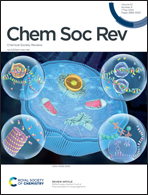Doublet-emissive materials for organic light-emitting diodes: exciton formation and emission processes
Abstract
Doublet-emission is mainly discovered in stable radicals, lanthanide–metal complexes with an f1 electron configuration and transition-metal complexes with a low-spin d5 electron configuration, and has a distinct radiation mechanism from closed-shell luminescent molecules and thus technology opportunities. There exists an unpaired electron in the frontier molecular orbitals which enables efficient nanosecond-scale luminescence in these materials due to the spin-allowed transitions between doublet-spin states. In this review, we summarize recent advances in these materials and their application in organic light emitting diodes (OLEDs). The photoluminescence and electroluminescence mechanisms of different doublet-emissive molecular systems are discussed, in addition to the photophysical phenomena arising from doublet states. We also outline the current challenges faced by each molecular system, and the potential outlook on the future research trends in this field.



 Please wait while we load your content...
Please wait while we load your content...